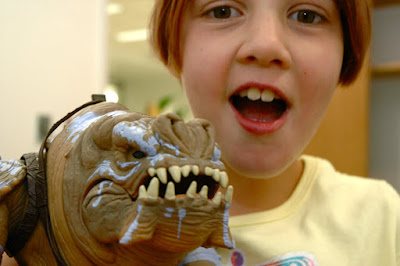No sad thought his soul affright;
Sleep it is that maketh night;
Let no murmur nor rude wind
To his slumbers prove unkind;
But a quire of angels make
His dreams of heaven, and let him wake
To as many joys as can
In this world befall a man.
Promise fills the sky with light,
Stars and angels dance in flight;
Joy of heaven shall now unbind
Chains of evil from mankind,
Love and joy their power shall break,
And for a new born prince’s sake;
Never since the world began
Such a light such dark did span.
I've written about how the holidays can be complicated for an agnostic family living in an overwhelmingly Christian society; I feel I write about it every year, actually. Not just for the obvious reasons, but also for the pangs of envy that come from watching others receive comfort and warmth from something that has meaning to them. I don't imagine the Rummel-Hudsons will ever become Christians, and certainly not just so we'll have a nicer time at Christmas. The challenge for us comes from searching for meaning in the world that we DO believe in, a world based not on the divinity of Christ and the community of believers, but on other things, smaller things, perhaps. Sometimes as small as a child.
Even for a non-Christian, there is still something powerful about the image of a newborn child during the holidays. It sounds treacly, bordering on cliché, but children really are promise, and in believing in the promise of a child, we find ourselves renewed. For me, from the shabby, sometimes wrecked perspective of middle age, that sense of renewal becomes especially important. When I went back and listened to the music that inspired that quote, I found myself catching my breath at the line declaring that this promise and this joy would break the chains of evil from mankind. The text is referencing the birth of a particular child, of course. And yet, it's important to remember, always remember, that no matter how happy and bright and shining our Christmas celebrations may aspire to be, there's always the end of that story to look forward to. In every Christmas, there is some Easter waiting.
In our simple joy, there is bittersweet sacrifice waiting.
This season feels different from holidays past. It seems harder somehow. In a larger sense, there's no mystery why, and I suspect that there are a great many homes feeling this. Newtown has darkened the holidays in a way that's not easily shaken off. It's too big; no amount of merry thoughts can dispel the mental images we've been trying to push out of our heads, or the heartbreak we've felt, over and over, unrelenting, as we meet the families and learn more about those who have been lost to us. How do we break those chains?
Even so, in the months before Newtown, the world had felt grey to me. The internet had seemed meaner, the real world conversations more terse. And Schuyler was facing the same things on a younger but hardly smaller scale, from girls her age who had already discovered the easy thrill of ostracization. She did so while stubbornly fighting her own unwinnable battle, the one where she believed that if she just tried hard enough, no one would care about her disability or even notice it. Before the world darkened at Newtown, it was already feeling like a stonier place than before.
I wish I had a "But then..." to go to, where I could share something that changed that, made it all better somehow, but I don't. I can only say that I haven't stopped looking for the light. I guess I feel I owe it to her not to miss it if it's there. My agnosticism is nothing like atheism. I haven't closed myself off to the promise latent in this universe to surprise or to elevate.
I don't believe in a holy Christ child, but I do believe in the possibilities of our young ones. I don't believe that Jesus will bring us salvation, but I haven't ruled out the possibility that we might be saved just the same.























